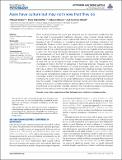Apes have culture but may not know that they do
Abstract
There is good evidence that some ape behaviors can be transmitted socially and that this can lead to group-specific traditions. However, many consider animal traditions, including those in great apes, to be fundamentally different from human cultures, largely because of lack of evidence for cumulative processes and normative conformity, but perhaps also because current research on ape culture is usually restricted to behavioral comparisons. Here, we propose to analyze ape culture not only at the surface behavioral level but also at the underlying cognitive level. To this end, we integrate empirical findings in apes with theoretical frameworks developed in developmental psychology regarding the representation of tools and the development of metarepresentational abilities, to characterize the differences between ape and human cultures at the cognitive level. Current data are consistent with the notion of apes possessing mental representations of tools that can be accessed through re-representations: apes may reorganize their knowledge of tools in the form of categories or functional schemes. However, we find no evidence for metarepresentations of cultural knowledge: apes may not understand that they or others hold beliefs about their cultures. The resulting Jourdain Hypothesis, based on Moliere's character, argues that apes express their cultures without knowing that they are cultural beings because of cognitive limitations in their ability to represent knowledge, a determining feature of modern human cultures, allowing representing and modifying the current norms of the group. Differences in metarepresentational processes may thus explain fundamental differences between human and other animals' cultures, notably limitations in cumulative behavior and normative conformity. Future empirical work should focus on how animals mentally represent their cultural knowledge to conclusively determine the ways by which humans are unique in their cultural behavior.
Citation
Gruber , T , Zuberbuehler , K , Clement , F & van Schaik , C 2015 , ' Apes have culture but may not know that they do ' , Frontiers in Psychology , vol. 6 , 91 . https://doi.org/10.3389/fpsyg.2015.00091
Publication
Frontiers in Psychology
Status
Peer reviewed
ISSN
1664-1078Type
Journal article
Description
The research leading to these results has received funding from the People Programme (Marie Curie Actions) and from the European Research Council under the European Union’s Seventh Framework Programme for research, technological development and demonstration under REA grant agreement n° 329197 awarded to Thibaud Gruber, ERC grant agreement n° 283871 awarded to Klaus Zuberbühler. Date of Acceptance: 16/01/2015Collections
Items in the St Andrews Research Repository are protected by copyright, with all rights reserved, unless otherwise indicated.

